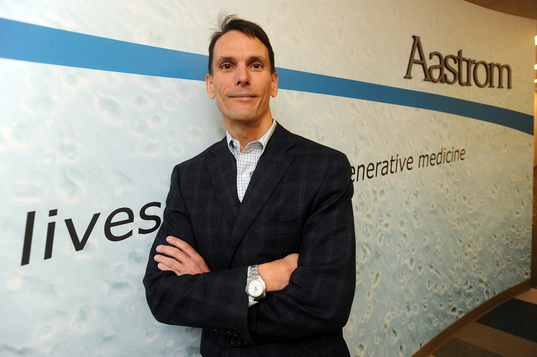Esperion Therapeutics veteran Timothy Mayleben becomes CEO of Aastrom Biosciences

Timothy Mayleben is the new CEO of Aastrom Biosciences.
Photo by Lon Horwedel | AnnArbor.com
Timothy Mayleben is endowed with the Esperion Therapeutics mystique.
Whether that helps him rescue Ann Arbor-based biotechnology firm Aastrom Biosciences is to be determined.
Mayleben, a longtime Aastrom board member, became CEO last week after ex-CEO George Dunbar asked him to take over. Dunbar will remain chairman in a transition revealed in September.
Aastrom is banking on Mayleben’s fundraising proficiency to help the company continue pursuit of its personalized medicine technologies. Mayleben joined the first version of Esperion in the late 1990s, eventually becoming chief financial officer and chief operating officer.
Esperion raised more than $200 million and was sold to Pfizer in 2004 for $1.3 billion. Esperion co-founder Roger Newton has since restarted the company, which Pfizer shuttered in 2007, after acquiring intellectual property from the pharmaceutical giant.
Financing is critical to the future of all biotech companies. It can take $1 billion to develop a therapy from concept to market, although Aastrom believes it won’t need nearly that much.
Mayleben said he’s hopeful that the company can attract investors to fund Aastrom’s technology.
“That’s where I think I can provide some real benefit and some real leadership,” he said.
The company has cleared a key hurdle that has made it difficult to raise funding. Until recently, Aastrom has struggled with it, in part because the firm has been hampered by structural problems associated with the way the company was set up when it was founded in 1989.
For example, the public company until recently needed approval of 2/3rds of its shareholders to approve a reverse stock split, a move the company considers critical to raising funds.
“That’s an incredibly high bar,” Mayleben.
Now, the company has secured approval from its shareholders to change the rules so that the company only needs a simple majority to implement a reverse stock split, which would raise its share price. Company officials have previously described the move as "vital to the future of the company."
Aastrom, whose stock has been hovering around $0.30 a share, got an extension from NASDAQ officials earlier this month to get its share above $1 - a level generally required to avoid delisting.
The firm has “permission to do it if we choose to do it, but we’re not going to pull the trigger on it right away necessarily,” Dunbar said.
The leadership transition comes after a tumultuous time for Aastrom, which laid off up to 25 workers in 2008 to cut costs. The company now has about 49 employees at its Domino's Farms office in Ann Arbor Township.
Dunbar said he’s confident that Aastrom is positioned to thrive. He said the firm has about a year’s worth of cash stockpiled to fund its operations.
“During my time here we’ve completely restructured the company, developed from scratch my clinical strategies in the cardiovascular area and have weathered the, if you will, financial storm,” Dunbar said. “The company’s probably in better shape than it has been.”
The company’s technology involves injecting engineered cells from a patient into their own diseased tissue. For example, the therapy could be used to help patients with dilated cardiomyopathy, which causes the heart to function improperly.
“It’s just taking the patient’s own cells, expanding those cells and then fusing those cells back into the diseased tissue,” Mayleben said. “Aastrom was personalized medicine before it was cool.”
The company is currently conducting Phase 2 studies on its key cardiovascular therapies. Mayleben estimated that the company could reach the market within 5 to 10 years.
Mayleben said the lessons of Esperion showed that promising technology will attract financing.
“We know this works,” he said of Aastrom’s technology. “We know the therapies work. What we need to do is design and execute these trials and then fund these trials.”
Aastrom lost $3.8 million for the quarter ended Sept. 30. That compared to a $3.9 million loss in the same period of 2008. Losses are typical for early-stage biotech companies.
Contact AnnArbor.com’s Nathan Bomey at (734) 623-2587 or nathanbomey@annarbor.com. You can also follow him on Twitter.

